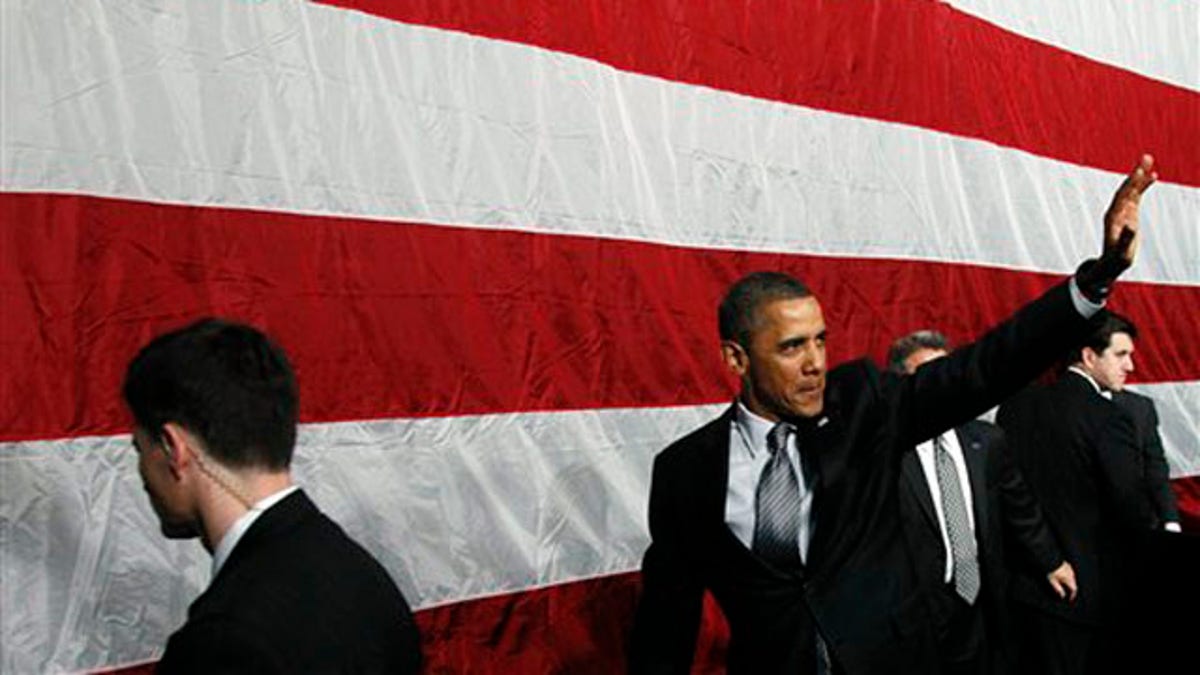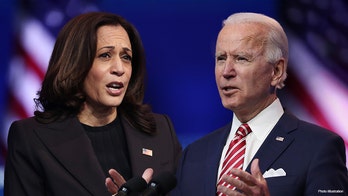
Jan. 11, 2012: President Obama waves after he spoke at a campaign event at the University of Illinois in Chicago. (AP)
President Obama says a campaign is like an investment.
If so, his is one of the most expensive start-ups of all time -- having raked in $750 million in 2008 and potentially on track to surpass that amount in 2012. His campaign and the Democratic Party raised $224 million in 2011 alone, more than the Republican field combined.
In a flagging economy, it may be hard to fathom not only where that money is coming from but also what it could buy if it were diverted elsewhere.
But based on estimates of costs tied to starting a small business, it translates into start-up costs for more than 22,000 new small businesses. Combining the donations to both Democratic and GOP fundraising efforts could fund about 43,000 small business start-ups.
That's not to say the campaign donations aren't being put to effective economic use. That money, presuming it's spent, will go toward food, campaign staff, office costs, transportation costs and lots and lots of ad buys.
"Obviously, it's blood for the TV and radio networks," said Duncan Moore, vice provost for entrepreneurship at the University of Rochester. "Iowa and New Hampshire, I can imagine, it really helps their bottom line."
But the climbing fundraising figures are jaw-dropping, particularly considering unemployment has been stuck at or above 8 percent for nearly three straight years.
The Obama campaign is dismissing speculation that it may be poised to raise $1 billion by November. But Brendan Glavin, data manager with the Campaign Finance Institute, said Obama appears to be "on pace" to at least surpass the $750 million he raised in 2008, which would set another record.
Obama, quoting friend and former lawmaker, judge and University of Chicago professor Ab Mikva, said at a campaign stop in Chicago Wednesday night that having a friend who is a politician is kind of like having a student who's permanently in college -- expensive.
"Basically every few months a tuition check comes, and you keep on thinking, haven't they graduated yet?" he told the crowd. "Here's the good news, is we're about to graduate. This will be the last campaign. And you know, when you think about what's at stake, I hope you end up feeling that there hasn't been a more important investment to make than the one that needs to be made this year, not just in terms of money but in terms of time and energy and effort and enthusiasm."
The pace of campaign fundraising has led to widespread complaints about the influence of money in politics.
Starbucks CEO Howard Schultz last year launched a campaign calling on fellow business leaders to flat-out suspend contributions to Congress and the president until a long-term deficit deal was reached. At the same time, he urged the leaders to spend money to hire more people to get the economy moving.
The suspension is still in effect and more than 150 business leaders have signed on, a Starbucks representative told FoxNews.com on Thursday.
In spite of such movements, Obama and the Democratic National Committee pulled in $68 million in the fourth quarter, bringing the year-end total to $224 million. Mitt Romney's campaign reported raising $56 million for all of 2011.
The entire GOP field, as well as the Republican National Committee, looks to be on pace to raise close to $210 million in 2011, though final numbers have not been released.
The numbers don't represent the entirety of political fundraising for 2012. So-called super PACs, which are supposed to be distinct from the campaigns, already are in full force paying for ads for the candidates of their choosing.
Fundraising is no shock to anyone familiar with political campaigning. But the numbers are stark when put up against the perpetual concern about job growth.
The estimate of how many small businesses the 2011 fundraising haul could support is based on a 2006 estimate by the Wells Fargo/Gallup Small Business Index, which found the average start-up cost for a small business to be $10,000.
The average start-up costs would be far greater when talking about the kinds of investments made by venture capitalists -- a popular talking-point on the campaign trail these days -- and "angel investors," individuals who use their own money.
According to numbers provided by the Tuck School of Business at Dartmouth, the average amount of money put up by a so-called "angel investor" for a business is about $400,000.
The 2011 fundraising for Democrats would translate to about 560 of those investments; the total fundraising among Democrats and Republicans would translate to more than 1,000.
Duncan had another way of looking at it. "I could buy 50,000 cars," he said, calculating what a $1 billion fundraising haul could buy.
Obama's 2008 fundraising total was also roughly equivalent to the economy of the South Pacific island nation of Vanuatu.
As the parties raise money for their respective nominee's presidential campaign, they are also looking to fund the big bashes set for late summer -- the national conventions, which will use a combination of public and private funds. According to a report in Bloomberg, Obama's campaign is considering holding the last day's events at Bank of America Stadium in Charlotte, N.C.
While Obama had previously criticized Bank of America for its proposed $5 monthly fee on customers, the idea behind the venue switch reportedly is to lure wealthy donors.




